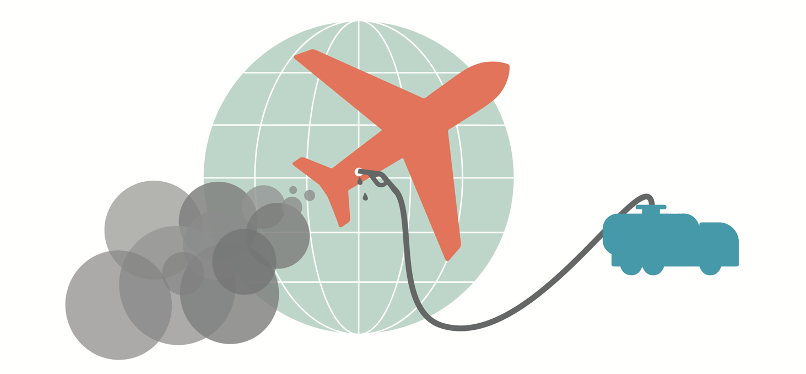Navigation auf uzh.ch
Navigation auf uzh.ch

The following subpage provides information about the process of flight data collection
Data collection

The Executive Board of the University has decided that UZH's flight-related greenhouse gas (GHG) emissions may increase to a maximum of 60 percent of the pre-pandemic level (average of 2018/2019 as baseline) in 2022 and must be reduced by at least 3 percent annually thereafter compared to the previous year. This corresponds to a total reduction in emissions of at least 53 percent by 2030. In addition, the university management recommends that the faculties set more ambitious reduction targets.
The University of Zurich is actively and consistently committed to the global goal of sustainable development. It has set itself the goal of climate neutrality by 2030 in the Implementation Strategy ("Umsetzungsstrategie") 2030 for the Sustainability Policy.
Air travel causes a large share of GHG emissions in UZH's regular operations. Before the Covid-19 pandemic, this share was around 35 percent (2018/2019) of UZH's total GHG emissions; due to the measures taken, this share has decreased and is now smaller than the share of UZH's electricity and heat purchases.
All flights that were at least half financed by UZH are taken into account. Around 85 percent of these emissions come from long-haul flights, although these only account for around one third of flights. Every avoided long-haul flight is therefore a considerable relief for the climate.
In 2022, flight-related GHG emissions were allowed to rise to a maximum of 60 percent of the 2018/19 level.
According to the decision of the Executive Board of the University, the faculties define own measures to reach the reduction target.
At the Faculty of Theology and the Study of Religion, flight costs are only covered if the following conditions are met:
Four faculties and one division of the Executive Board of the University want to offset their GHG emissions of flight-related emissions (or part of them), in addition to introducing their reduction measures . The Sustainability Team took over the coordination in this regard and has selected an offset provider for the years 2023 and 2024 as part of this pilot project. This is atmosfair.
atmosfair
In the selection process, it was particularly important that the credits are of a very high quality (including additionality and permanence as well as co-benefits, e.g. promotion of biodiversity), so that the ecological benefit is secured.
Travelling fewer air miles is the most important lever for reducing GHG emissions. Basically, there are the following options:
For unavoidable air travel, the following measures help to significantly reduce the environmental impact:
The Department of Geography is playing a pioneering role in reducing flight-related emissions at UZH. In order to obtain data tailored to its own needs, the department collects information on employees' reasons for travelling in addition to the flight travel data. This makes it possible to develop specific recommendations for action to reduce emissions at the department. The department is also active in the area of community building – for example by organising workshops – and thus promotes exchange among researchers on the topic of flight-related emissions.
Department of Geography
Global Student Experience raises awareness among students about sustainability in the context of mobility during semesters abroad, summer schools or internships by providing tips on its website and by sending out information sheets. The suggestions are aimed at both outgoing and incoming students. Those who travel there and back by train receive financial support of 100 francs as a so-called "Green Travel Top Up".
Global Student Experience
"Green Travel Top Up"
Since May 2021, UZH employees have been able to declare voluntary commitments to reduce their flight-related GHG emissions and other sustainability measures on an online plattform. This option is increasingly being used.
Voluntary commitment
UZH is a member of two networks related to air travel:
Universities and researchers around the world are also working towards a scientific environment with fewer GHG emissions from air travel, for example in these international networks:
The universities of Edinburgh and Lund. Other universities and their efforts are shown in this interaktive map created by a doctoral student at ETH Zurich.
University of Edinburgh
University of Lund
interaktive map